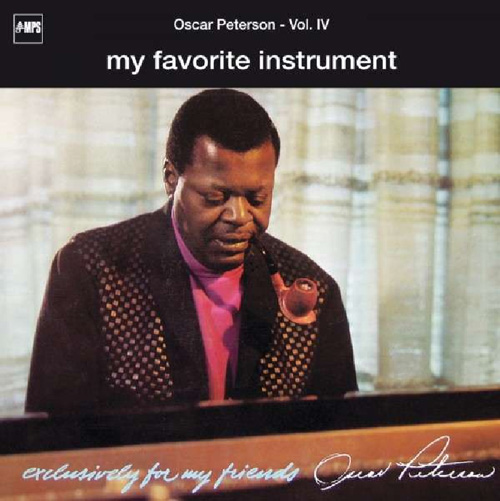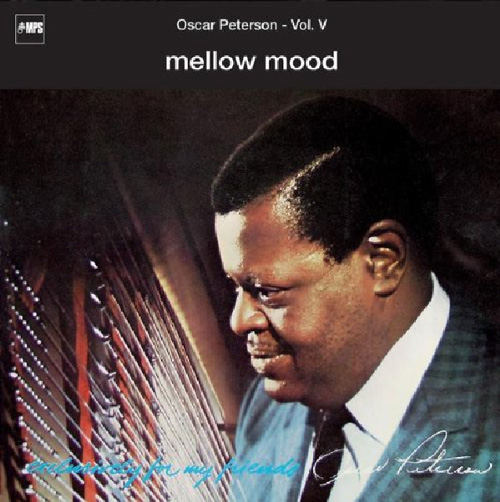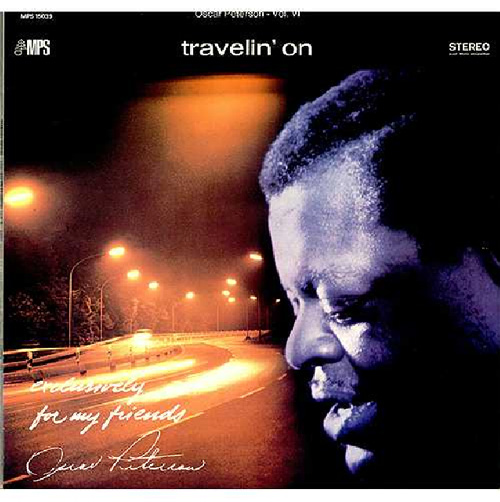Volume IV
My Favorite Instrument
Oscar Peterson |
Piano |
Hans Georg Brunner-Schwer |
Engineer, Recording Director |
“Someone to Watch over Me” (George Gershwin, Ira Gershwin) – 4:18
“Perdido” (Ervin Drake, Hans Jan Lengsfelder, Juan Tizol) – 6:17
“Body and Soul” (Frank Eyton, Johnny Green, Edward Heyman, Robert Sour) – 4:36
“Who Can I Turn To (When Nobody Needs Me)” (Leslie Bricusse, Anthony Newley) – 5:02
“Bye Bye Blackbird” (Mort Dixon, Ray Henderson) – 4:56
“I Should Care” (Sammy Cahn, Axel Stordahl, Paul Weston) – 4:48
“Lulu’s Back in Town” (Al Dubin, Harry Warren) – 2:10
“Little Girl Blue” (Lorenz Hart, Richard Rodgers) – 6:07
“Take the “A” Train” (Billy Strayhorn) – 2:39
Amazingly enough, this was Peterson’s first 100% solo record. Set free of the constraints of an ensemble, he is free to let his fancies take flight. The sound on this album is my favorite of the box set, setting the piano slightly larger than life, but centered, where it should be. While Peterson is often compared to Tatum, I find Peterson’s playing more structurally sound (he adheres to the original form more faithfully, where Tatum will move on to something else 1/3rd of the way through a phrase). So the songs here are better preserved, compared to one of Tatum’s 3AM concerts.
Volume V
Mellow Mood
| Bobby Durham | Drums |
| Sam Jones | Bass |
| Oscar Peterson | Piano |
| Hans Georg Brunner-Schwer | Engineer, Recording Director |
“In a Mellow Tone” (Duke Ellington, Milt Gabler)
“Nica’s Dream” (Horace Silver)
“On Green Dolphin Street” (Bronislau Kaper, Ned Washington)
“Summertime” (George Gershwin, Ira Gershwin, DuBose Heyward)
“Sometimes I’m Happy” (Irving Caesar, Vincent Youmans)
“Who Can I Turn To (When Nobody Needs Me)” (Leslie Bricusse, Anthony Newley)
Mellow Mood is noticeably better than the preceding records in my opinion. The choice of material is more adventurous. Not only is the sound better, but “In a Mellow Tone” opens with such solid straight ahead jazz that it forces you to pay attention. The funny thing is, “In a Mellow Tone” isn’t mellow. It’s quite forceful. The ensemble is more precise here, while remaining loose, a prerequisite for good improvisation.
“Nica’s Dream”, by Jazz Messenger Horace Silver, comes on like a cool breeze and builds intensity. Sam Jones plays as if it’s a bass-piano duet. “On Green Dolphin Street” is a favorite of Peterson’s, and his playing here is more restrained, though just as rewarding. His development of the melody is more imaginative than previous recordings, in my opinion.
“Summertime” is a standard of standards, and here Peterson gives a unique interpretation, faster and less melancholy than most, though still presented as a blues. The livin’ is easy.
“Sometimes I’m Happy”, a pretty tune, is nice filler between “Summertime” and “Who Can I Turn To (When Nobody Needs Me)?”. The last tune is the mellowest of the set. It’s quite touching before suddenly exploding out of the gate (for a mad dash to the finish line). This is another great way to close out a set.
Volume VI
Travelin’ On
| Bobby Durham | Drums |
| Sam Jones | Bass |
| Oscar Peterson | Piano |
| Hans Georg Brunner-Schwer | Engineer, Recording Director |
“Travelin’ On” (Traditional)
“Emily” (Johnny Mandel, Johnny Mercer)
“Quiet Nights” (Antonio Carlos Jobim, Gene Lees)
“Sax No End” (Francis Boland)
“When Lights Are Low” (Benny Carter, Spencer Williams)
“Travelin’ On” is full of the Spirit. Peterson plays as if the Holy Spirit has taken over his fingers for an incredible, almost miraculous, demonstration of technique. This tune is a highlight in the set. Traditional church tunes are always fun.
“Emily” is a touching tune, played with a very light touch and sensitive phrasing from the trio. “Quiet Nights”, the Jobim mega-hit, is a joy. The trio’s playing is suave, starting with a whisper of an intro, before another incredible display of Peterson’s technique.
On “Sax No End” Peterson plays with different registers and voices, imitating the different sounds of a big band. He’s all over the keyboard in an astonishing display.
“When Lights Are Low” finishes the set with a fine display of Peterson’s ability to sustain a quiet tune. Throughout the set, Peterson never loses intensity or focus. Weather as a soloist, or accompanist, Peterson’s playing always rises to the occasion. In the case of these recordings, he was given the freedom to pick the tunes he wanted, to be played in a relaxed setting, and he responds with one exceptional performance after another.
Not Exclusively For Jazz Fans
This is serious jazz, but it’s accessible for most listeners. Many of the tunes are well known. If you aren’t sure, most of these recordings are probably on YouTube, so please sample if you aren’t sure.
The sound varies from date to date, but it’s always full bodied. The mastering is excellent and the pressings are quiet. The packaging is tremendous, with beautiful lithography.
It’s been 30 years since I heard Peterson for the first time, and hearing these performances reminds me of why it was such a life changing experience.
- ← Previous page
- (Page 2 of 2)




Hi,
read your article with great interest and it gives the envy of buying this set right away. Forgive me id I miss it but is this set CDs or LPs?
Best
Olivier,
The set is available as CD and LP.
This review was just of the LP set.
Thanks for asking.
Regards,
Phillip